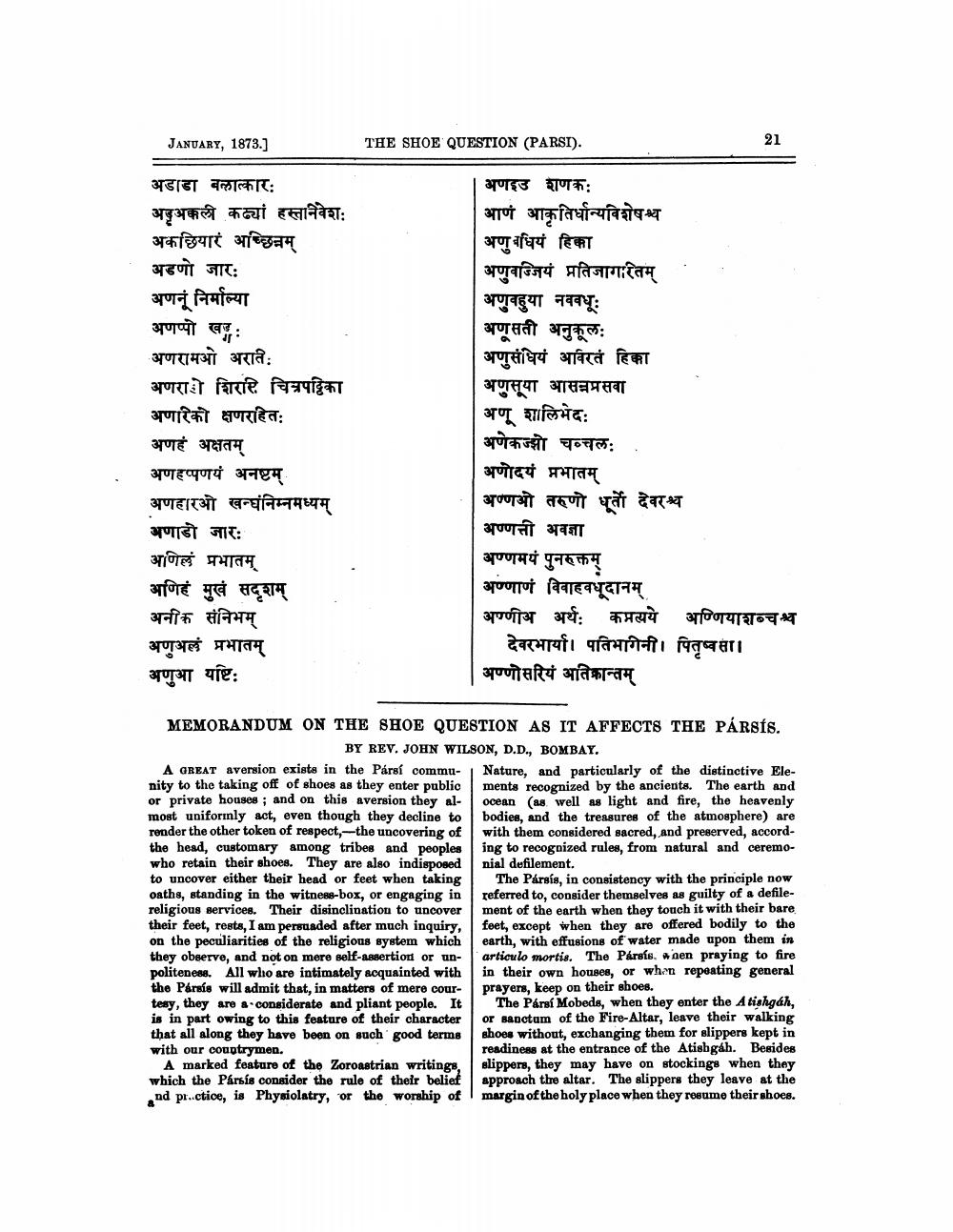________________
JANUARY, 1873.]
THE SHOE QUESTION (PARSI).
अडाडा बलात्कार: अअक्कली कयां हस्तनिवेश: अकछियारं अच्छिन्नम् अडणो जार: अणनूं निर्माल्या अणप्पो खजः अणरामओ अरात: अणराहो शिरसि चित्रपट्टिका अणारको क्षणरहित: अणहं अक्षतम् अणहप्पणयं अनष्टम् अणहारओ खन्घनिम्नमध्यम् अणाडो जारः अणिलं प्रभातम् अणिहं मुखं सदृशम् अनीक संनिभम् अणुअलं प्रभातम् अणुआ यष्टिः
अणइउ शणक: आणं आकृतिर्धान्यविशेषश्च अणुबधियं हिका अणुवज्जियं प्रतिजागरितम् ।। अणुवहुया नववधूः अणूसती अनुकूल: अणुसंधियं अविरतं हिक्का अणुसूया आसन्नप्रसवा अणू शालिभेद: अणेकज्झो चन्चल: . अणोदयं प्रभातम् अण्णओ तरुणो धूर्ती देवरश्व अण्णत्ती अवज्ञा अण्णमयं पुनरुक्तम् अण्णाणं विवाहवधूदानम् अण्णी अर्थ: कात्यये अण्णियाशब्चश्व
देवरभार्या। पतिभागनी। पितृष्वसा। अण्णोसरियं अतिक्रान्तम्
MEMORANDUM ON THE SHOE QUESTION AS IT AFFECTS THE PÁRSÍS.
BY REV. JOHN WILSON, D.D., BOMBAY. A GREAT aversion existe in the Pársí commu- Nature, and particularly of the distinctive Elenity to the taking off of shoes as they enter public ments recognized by the ancients. The earth and or private houses; and on this aversion they al- ocean (as well as light and fire, the heavenly most uniformly act, even though they decline to bodies, and the treasures of the atmosphere) are render the other token of respect,--the uncovering of with them considered sacred, and preserved, accordthe head, customary among tribes and peoples ing to recognized rules, from natural and ceremowho retain their shoes. They are also indisposed nial defilement. to uncover either their head or feet when taking The Pársís, in consistency with the principle now oaths, standing in the witness-box, or engaging in | referred to, consider themselves as guilty of adefilereligious services. Their disinclination to uncover ment of the earth when they touch it with their bare their feet, rests, I am persuaded after much inquiry, feet, except when they are offered bodily to the on the peculiarities of the religious system which earth, with effusions of water made upon them in they observe, and not on mere self-assertion or un- articulo mortis. The Pársís, when praying to fire politeness. All who are intimately acquainted with in their own houses, or when repeating general the Parsis will admit that, in matters of mere cour- prayers, keep on their shoes. tesy, they are a considerate and pliant people. It The Paraí Mobeds, when they enter the Atishgah, is in part owing to this feature of their character or sanctum of the Fire-Altar, leave their walking that all along they have been on such good terms shoes without, exchanging them for slippers kept in with our countrymen.
readiness at the entrance of the Atisbgáh. Besides A marked feature of the Zoroastrian writings. slippers, they may have on stockings when they which the Parsis consider the rule of their belief approach the altar. The slippers they leave at the nd pr..ctice, is Physiolatry, or the worship of margin of the holy place when they resume their shoes.




